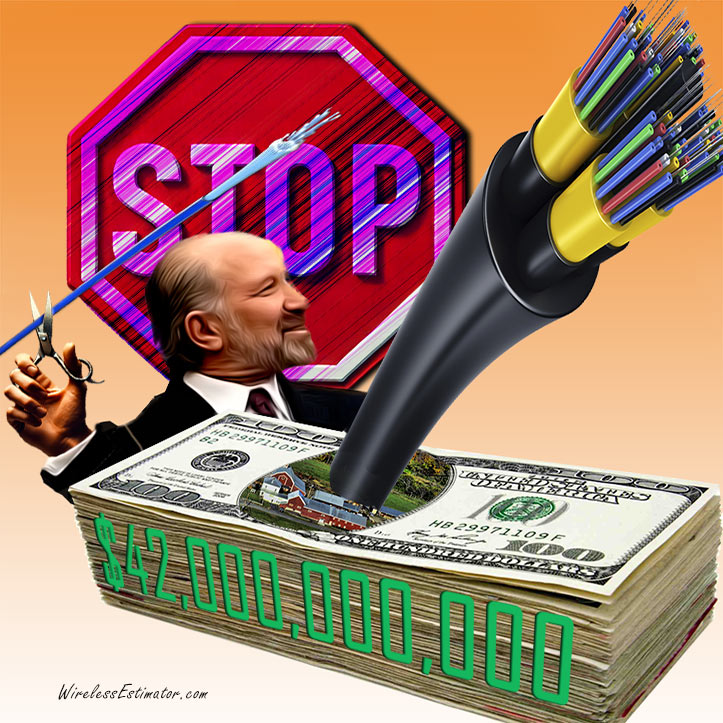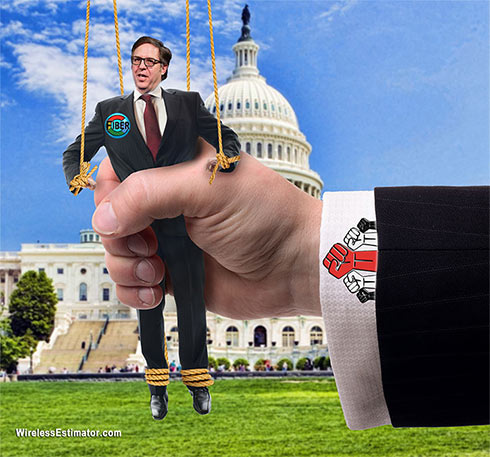
FIBER, ONCE THE DARLING of the BEAD program, will see a severe cut in funding, according to Commerce Secretary Howard Lutnick, who said the program was “in dire need of a readjustment” and must remain tech-neutral.
Commerce Secretary Howard Lutnick announced a significant overhaul of the $42 billion Broadband Equity, Access, and Deployment (BEAD) program, signaling a shift from its previous fiber-centric focus. Fiber optics, once seen as the cornerstone for high-speed internet infrastructure, could become less viable due to escalating costs and a new “tech-neutral” approach.
The Commerce Secretary’s initiatives could result in wireless infrastructure contractors recapturing more available funding.

During a hearing in February 2022 of the House Energy and Commerce Subcommittee on Communications and Technology, NTIA Administrator Alan Davidson said that sunlight was the best disinfectant. Then he pulled down the shades, according to industry observers who believe the CWA and fiber suppliers and organizations had him in their back pocket. However, the Trump administration’s Commerce Secretary Howard Lutnick is disbanding fiber-centric funding in the BEAD program.
Lutnick pledged to eliminate what he described as “pointless requirements” imposed by the previous administration, including regulations favoring certain technologies, burdensome labor rules, and climate-related mandates. He criticized the Biden administration’s handling of the program as “in dire need of a readjustment” and promised to cut red tape to speed up infrastructure projects.
“Under the revamped BEAD program, all Americans will receive the benefit of the bargain that Congress intended,” Lutnick said. “We’re going to deliver high-speed internet access efficiently and effectively at the lowest cost to taxpayers.”
The shift to a technology-neutral approach could open the door for alternative solutions like satellite and fixed wireless services, potentially sidelining fiber as the preferred option. This change comes amid rising costs for fiber deployment, which industry experts warn could disrupt the viability of fiber as a long-term solution for bridging the digital divide.
Fiber’s future in question
The program’s previous emphasis on fiber was seen as essential for ensuring high-speed, reliable internet access, particularly in underserved rural areas. However, with the Commerce Department now seeking to level the playing field for various technologies, the cost-effectiveness of fiber is under scrutiny. The Wall Street Journal reported that Elon Musk’s satellite internet venture, Starlink, could be among the biggest beneficiaries of the revamped BEAD program, potentially capturing billions of dollars in funding.
Democrats voiced concerns that the new approach might undermine fiber’s long-term benefits. Rep. Frank Pallone of New Jersey argued that the Commerce Department’s decision to drop fiber-centric mandates could disproportionately benefit companies like Starlink, which previously struggled to qualify for BEAD funding.

FIBER-CENTRIC Trueline Infrastructure Solutions, a new company formed by the rollup of three existing enterprises, collapsed last week, mainly due to the BEAD program’s inability to effectively roll out funding. If they had been able to continue with additional venture capital, the new administration’s pivot away from a fiber-centric approach would have indeed dealt the Coup de grâce for the telecommunications company.
“The pauses we see at the Department of Commerce are like shackles on broadband providers in Louisiana, Nevada, and Delaware, who need only basic administrative approvals to begin their work,” Pallone said.
Lutnick’s announcement coincided with a House Energy and Commerce Committee hearing titled “Fixing Biden’s Broadband Blunder,” where Republicans introduced the SPEED for BEAD Act. The proposed legislation seeks to expedite broadband deployment by removing regulatory hurdles.
Rep. Richard Hudson (R-NC), who chairs the subcommittee, expressed support for the review and emphasized the need for swift action. “It has been over three years since the IIJA became law, and we are still waiting for the first home to be connected using these funds,” Hudson said.
Meanwhile, broadband providers and state officials are left navigating the uncertainty created by the Commerce Department’s pivot away from fiber. Analysts warn that if fiber’s future as the backbone of America’s broadband infrastructure is indeed disrupted, it could set back efforts to close the digital divide.














